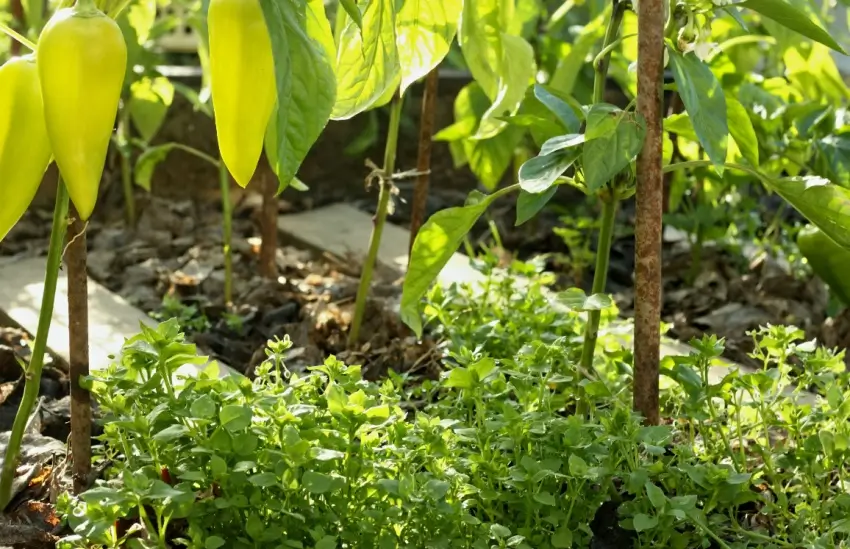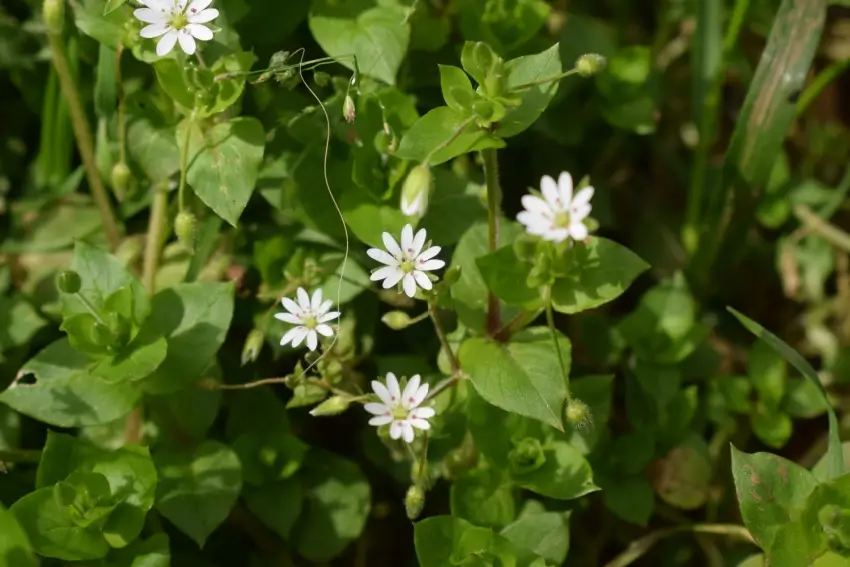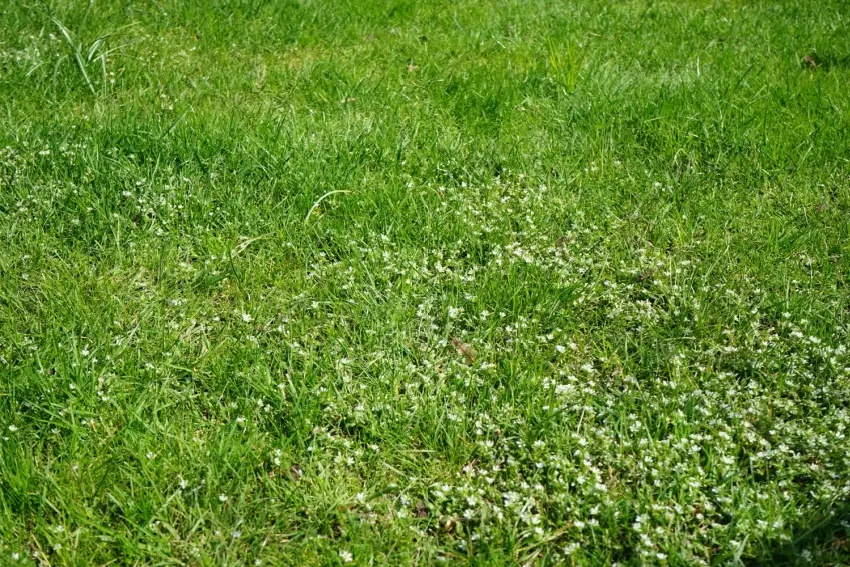
The Grounds Guys offer expert advice on eliminating chickweed from your garden:
|
For centuries, natural healers have used chickweed to create poultices, salves, teas, and tinctures for various health ailments. However, just because you might sip some chickweed tea to soothe a troubled tummy or aching arthritis doesn’t mean you want a carpet of chickweed in your yard. This stubborn and common weed is found throughout the United States and can diminish the look of your lawn. It can also compete with your grass and garden plants for sunlight, nutrients, and water.
Many homeowners and property managers ask us how to get rid of chickweed. However, before you start stamping out this weed, it helps to know more about it.
Table of Contents:
What Is Chickweed?
If you’ve got chickweed in your yard, chances are your uninvited lawn guests are one of two related but distinct species of weeds. Common chickweed (Stellaria media) is a low-growing, creeping annual. Its shallow root system can quickly form dense mats over your lawn.
Mouse-eared chickweed (Cerastium fontanum) has slightly larger, fuzzy leaves that resemble mouse ears. The two types of weeds have similar growing habits and often grow in cool, moist conditions.
How to Identify Chickweed

You want to know how to kill chickweed, but first, you’ve got to successfully identify the weeds in your yard. Many common weeds share similarities, and it can be easy to confuse them. So, head outside and give your weed patches a good, hard look.
Common chickweed possesses several distinct features:
- Leaves: Small, oval-shaped and smooth. The leaves grow in pairs opposite each other.
- Stems: Slender, green, and can grow up to approximately 15 inches long
- Flowers: Small, white, and star-shaped with five deeply notched petals
- Season: Typically appears in the spring or fall when temperatures are cool and moisture levels are high
How to Get Rid of Chickweed
It’s time to learn what kills chickweed. If these mat-like weeds are spreading across your yard, you’ve got several different termination options.
- Hand-pulling: If you’ve only got a small patch of chickweed in your yard, the best way to get rid of them could be to simply slip on your gardening gloves, grab a trowel, and hand-pull them. Pull out the entire weed, including the roots, so it won’t grow back.
- Natural remedies: If you prefer to use non-toxic weed killers on your lawn, you can have a natural concoction. Add vinegar, salt, and dish soap to water for a homemade herbicide. Another natural option is to pour boiling water on your chickweeds.
- Post-emergent herbicides: For larger infestations, you may need to bring out the big guns. Head to your local gardening or home improvement store and pick up a post-emergent herbicide designed to kill weeds that have sprouted.
What Is the Best Herbicide to Kill Chickweed?
If you decide to use a post-emergent herbicide as part of your chickweed control, we strongly suggest choosing a product effective against broadleaf weeds, like chickweed. Selective herbicides can be safer for your lawn than non-selective herbicides, which typically kill any plant they touch.
Broadleaf herbicides are easy to find at most landscaping and home improvement stores. They are sold under several different brand names but usually include one or more of the following ingredients:
- 2,4-D
- Mecoprop
- Dicamba
- Triclopyr
- Glyphosate
How to Get Rid of Chickweed Without Killing Your Grass

Be careful as you prepare to battle your chickweed infestation. An all-out war could turn your grass and garden plants into collateral damage. Certain methods, like homemade weed killers, boiling water, or non-selective herbicides on chickweeds, could also harm nearby plants.
If you choose these methods to combat your chickweeds, take extra care.
- Only apply your weed killer directly to the weeds.
- Don’t spray non-selective herbicides on windy days or if the forecast calls for rain.
- Consider using a spray shield on your herbicide sprayer.
- Consider covering surrounding plants.
The best way to protect plants and your lawn from your chickweed battle is to hand-pull your chickweeds or use a selective herbicide to attack broadleaf weeds.
Chickweed Control: How to Prevent Chickweed from Returning
It can be a long, hard struggle to achieve chickweed control. After your victory, don’t just rest on your laurels and assume your chickweed is defeated for good. A few stray chickweed seeds floating on the wind or hidden in the soil could start the cycle again. That’s why you need to shift your efforts to chickweed prevention.
- Take care of your lawn: One of the best ways to prevent chickweeds from returning is to keep your lawn dense and healthy so your grass can outcompete new weeds.
- Mulch garden beds: Apply a thick layer of organic mulch to suppress chickweed growth.
- Avoid overwatering: Chickweed thrives in moist conditions, so don’t water your lawn or garden too much.
- Use pre-emergent herbicides: Spray the areas of previous chickweed growth with a pre-emergent broadleaf herbicide in early spring to prevent weed seeds from sprouting.
- Get help: Hire a professional landscaping team to assist you with weed control and lawn care.
Keep Your Lawn Chickweed-Free
If you struggle to find the time for lawn care or simply want some professional help, contact us at The Grounds Guys®.
Our team is ready to spring into action. We can provide ongoing lawn and garden care, as well as residential and commercial weed removal. We can defeat your current chickweed invasion and ensure those stubborn weeds never return.
Request a free estimate today.
This article is intended for general guidance only and may not be applicable to every situation. You are responsible for determining the proper course of action for your property and your situation. The Grounds Guys is not responsible for any damages that occur as a result of any advice or guidance derived from blog content. For the most accurate guidance, contact an independently owned and operated The Grounds Guys for more information and a professional on-site assessment.